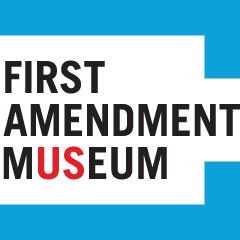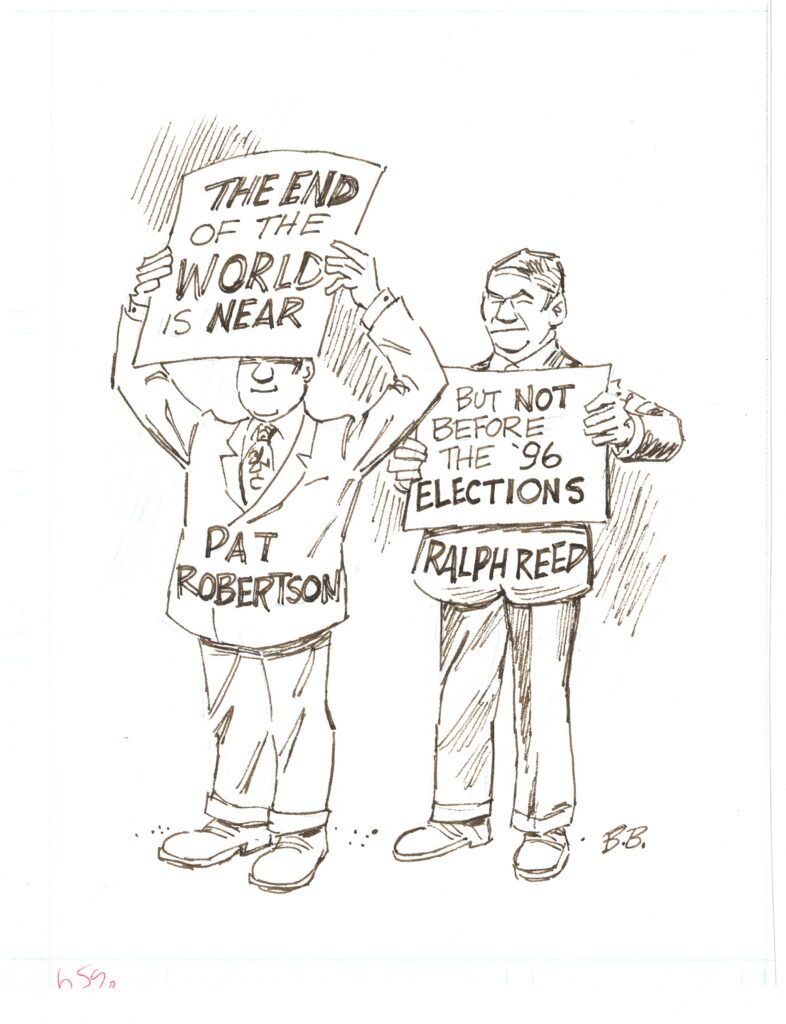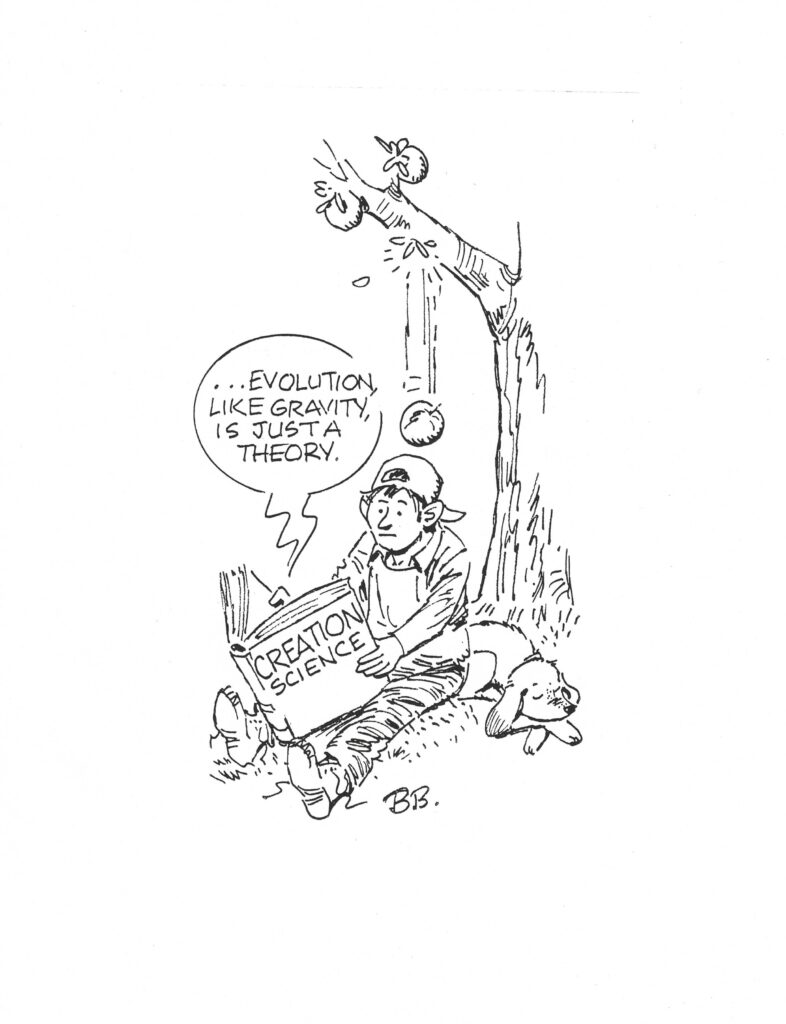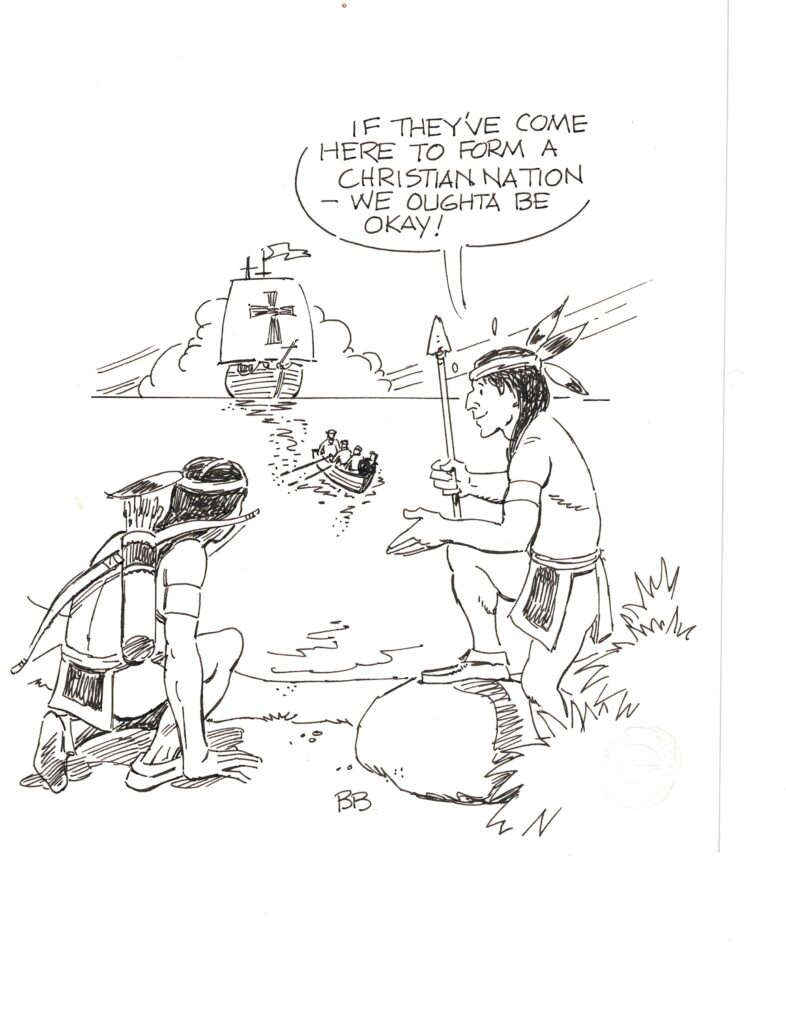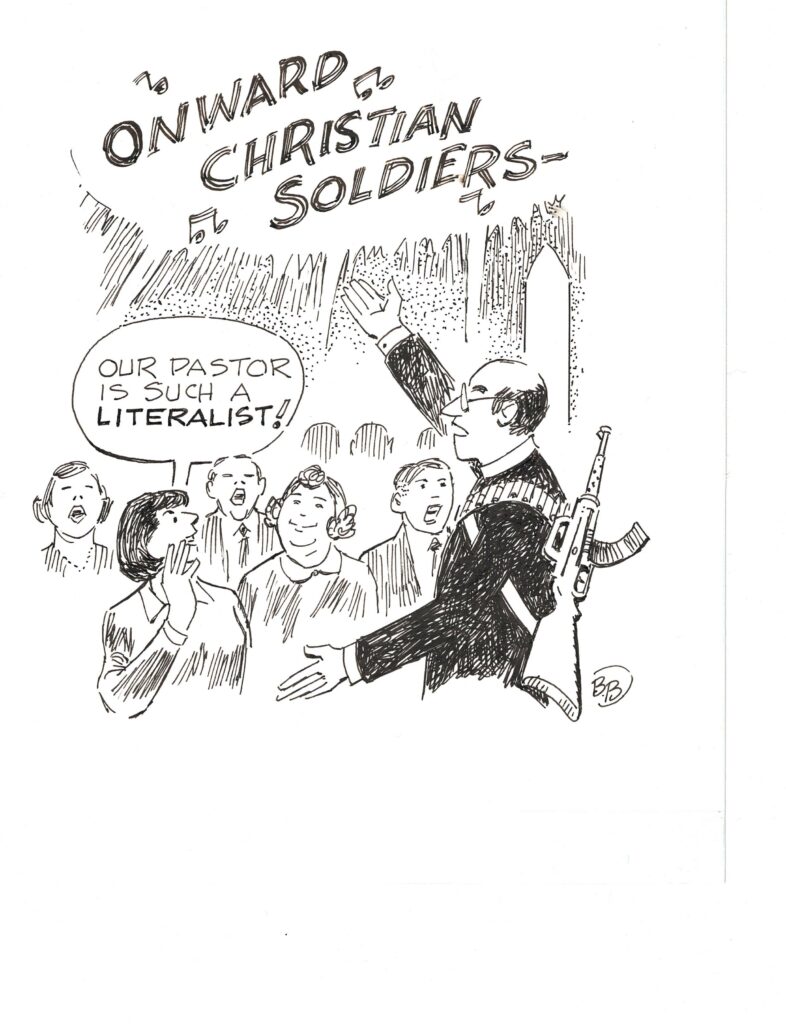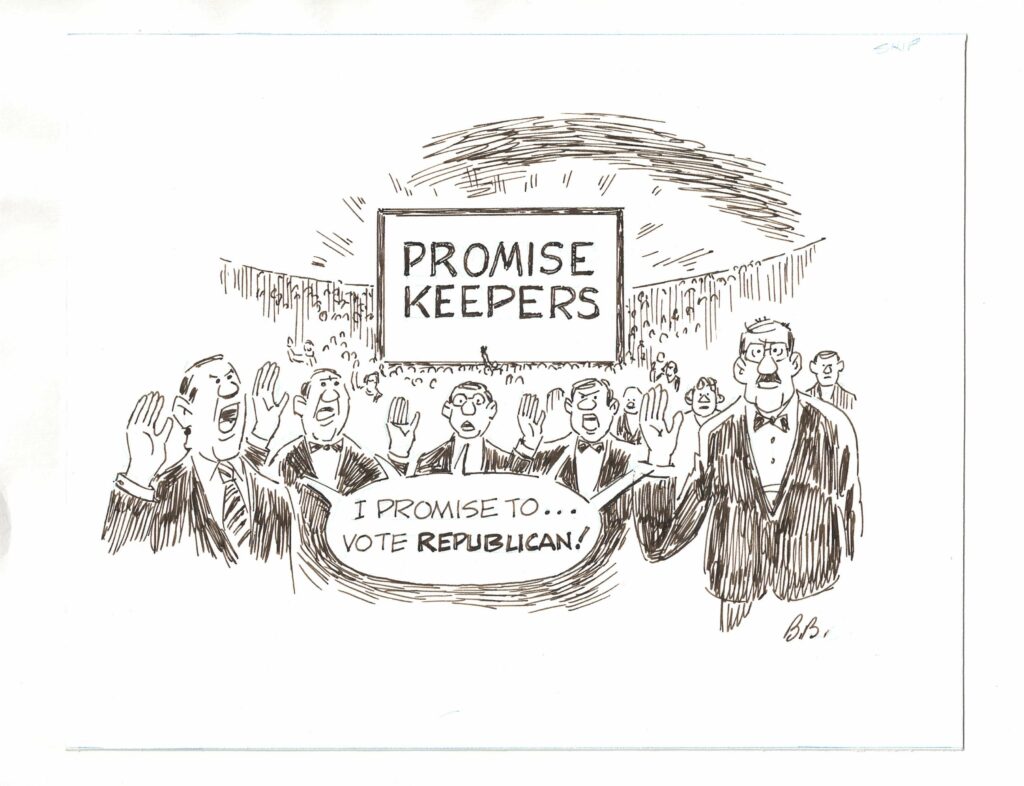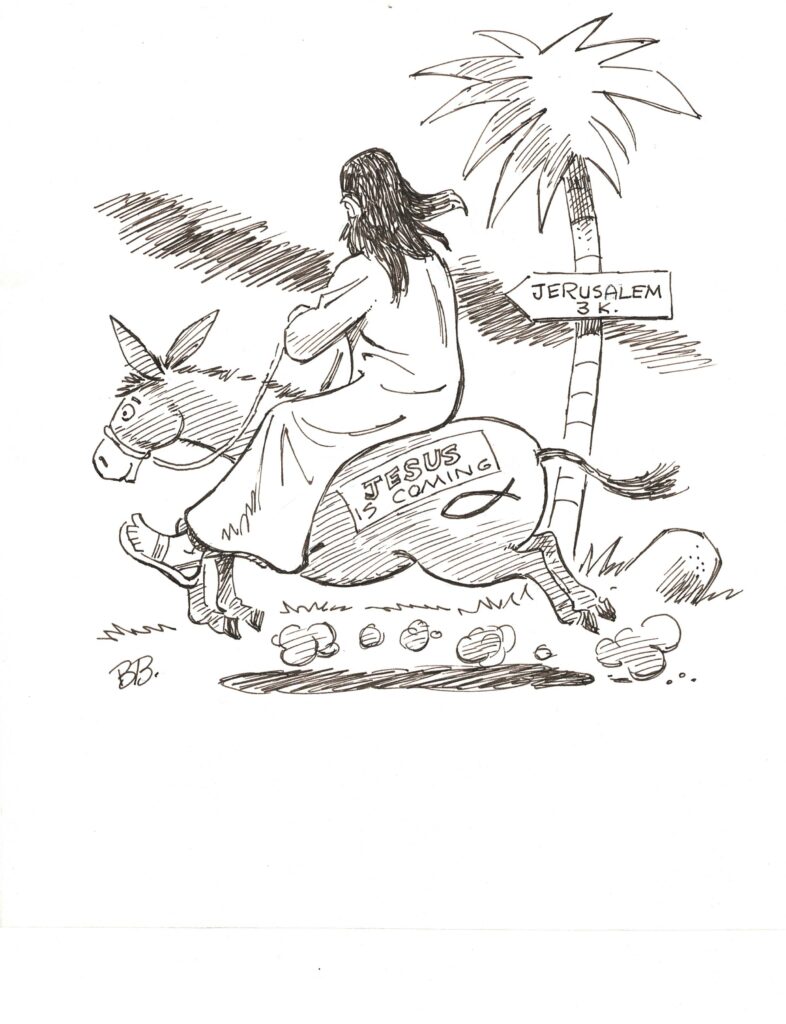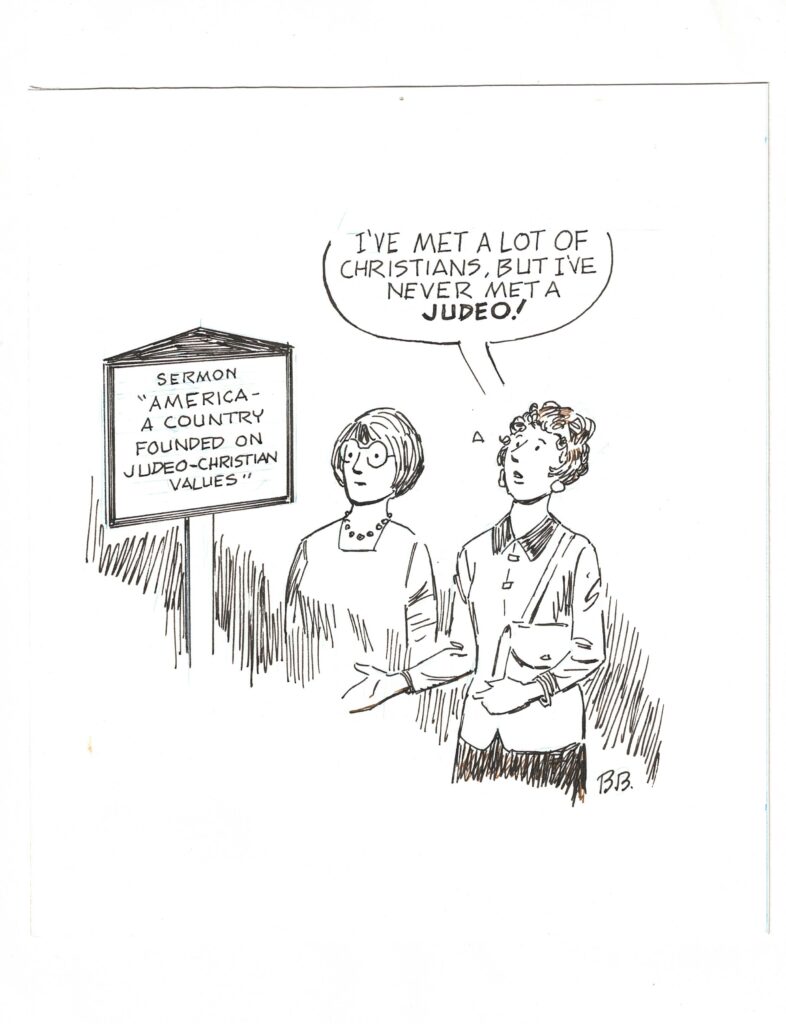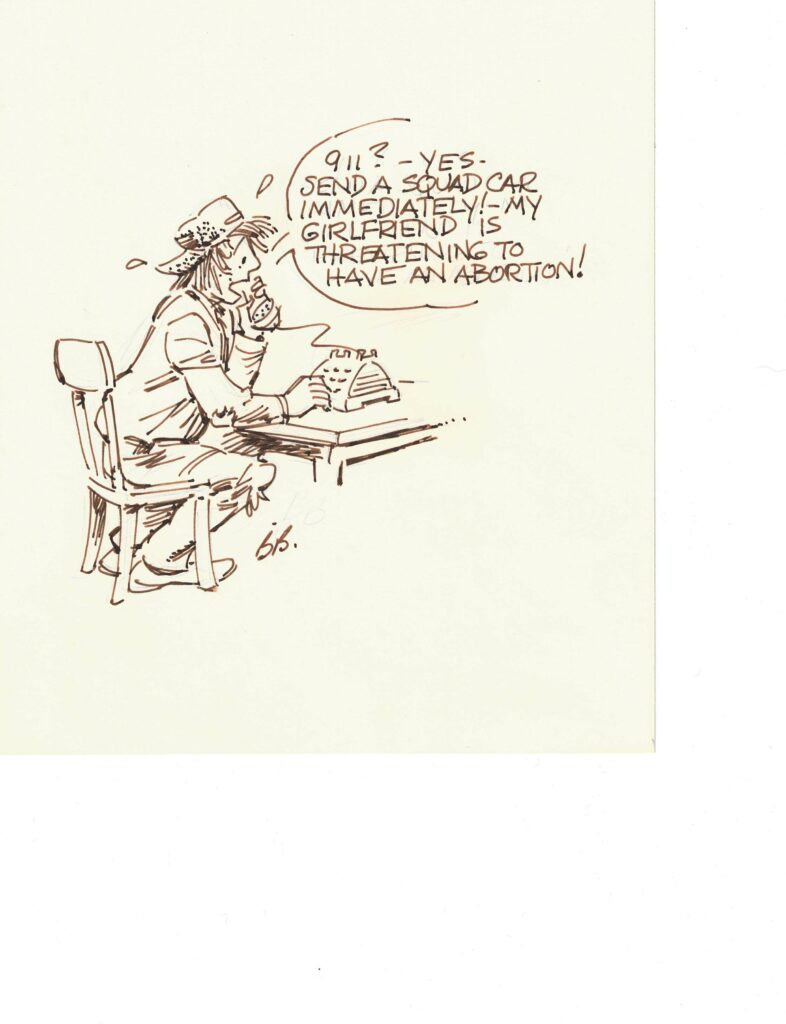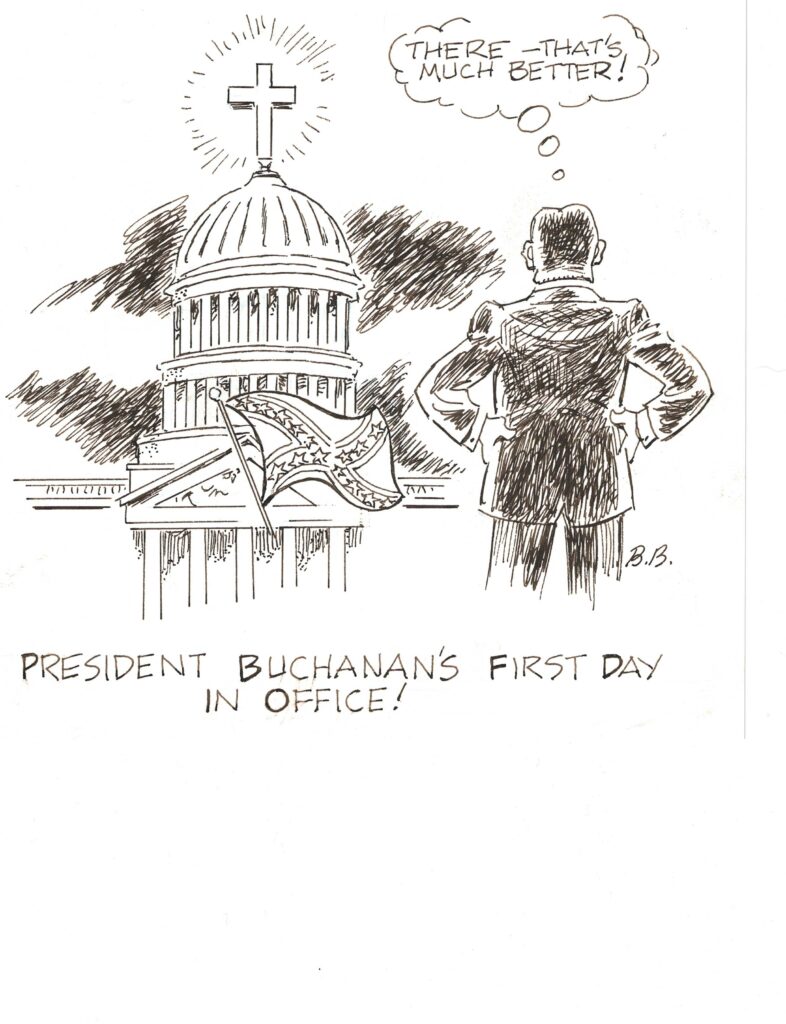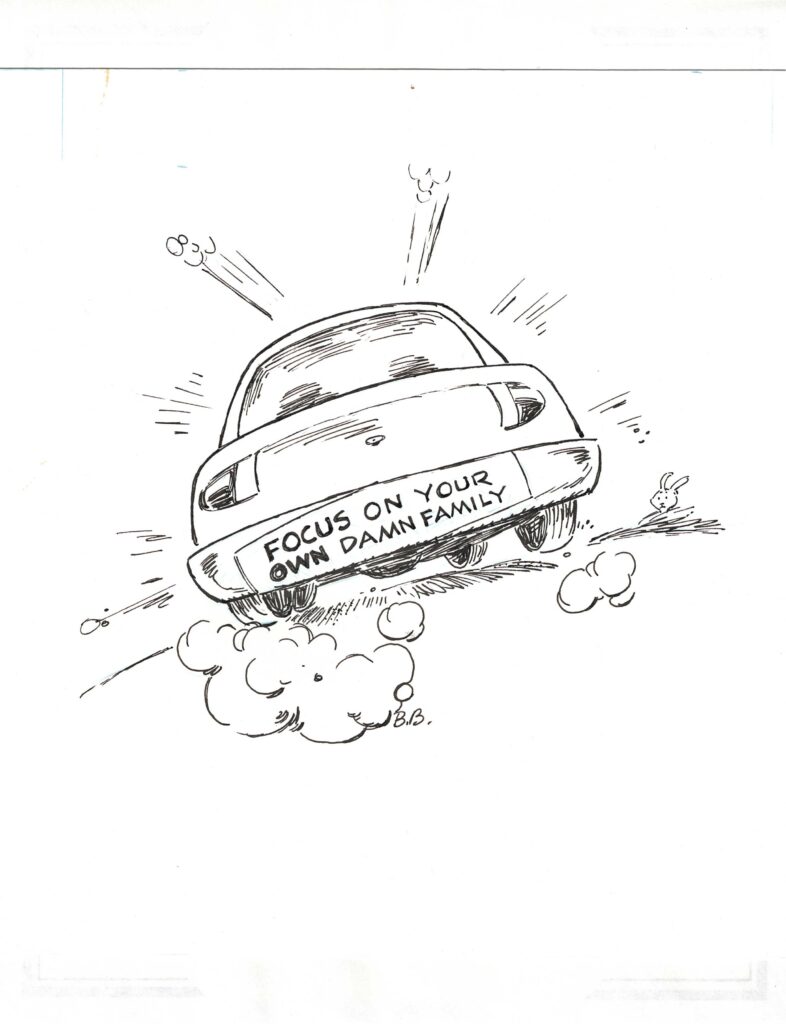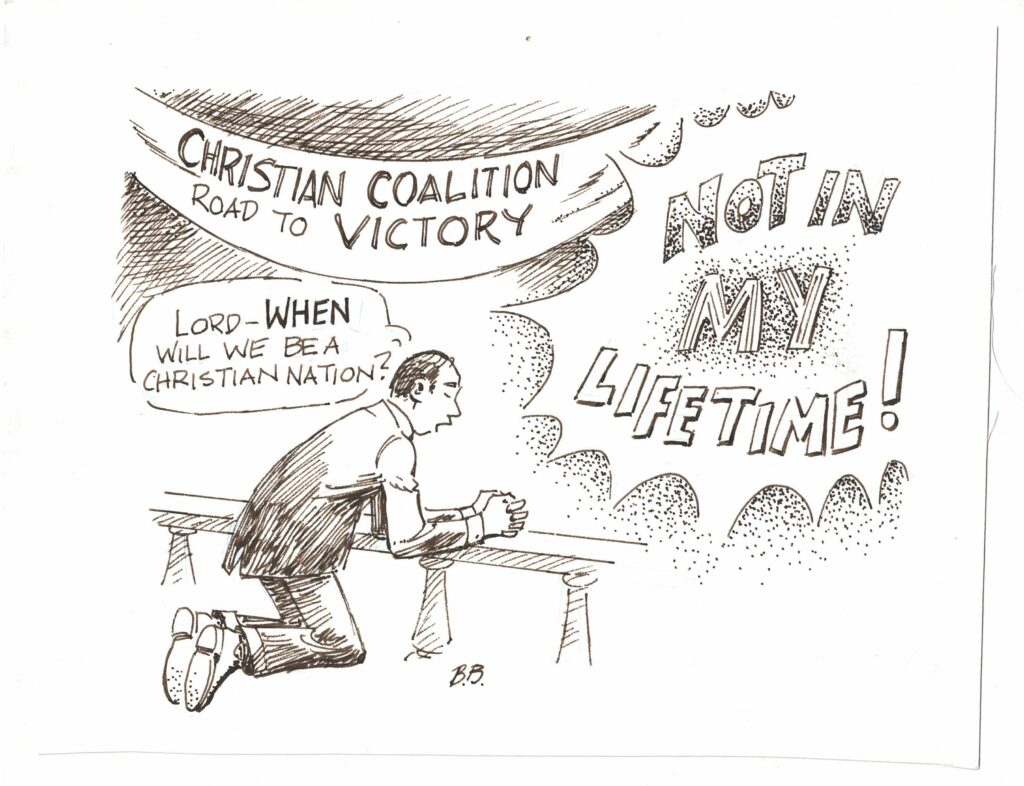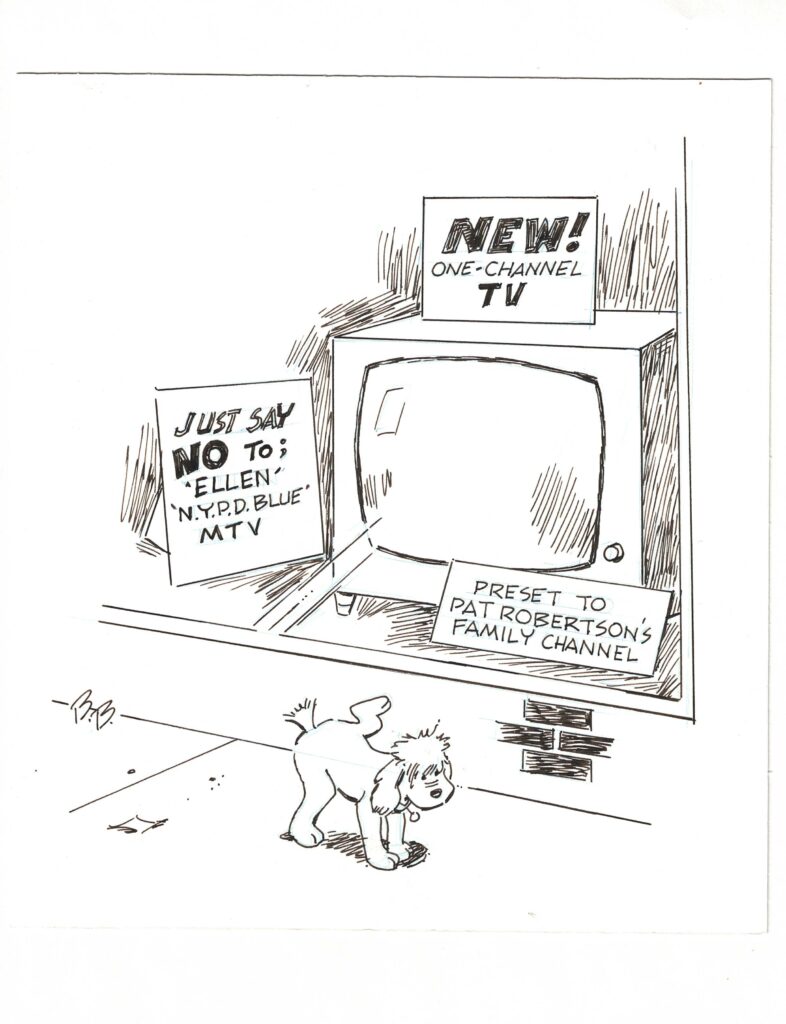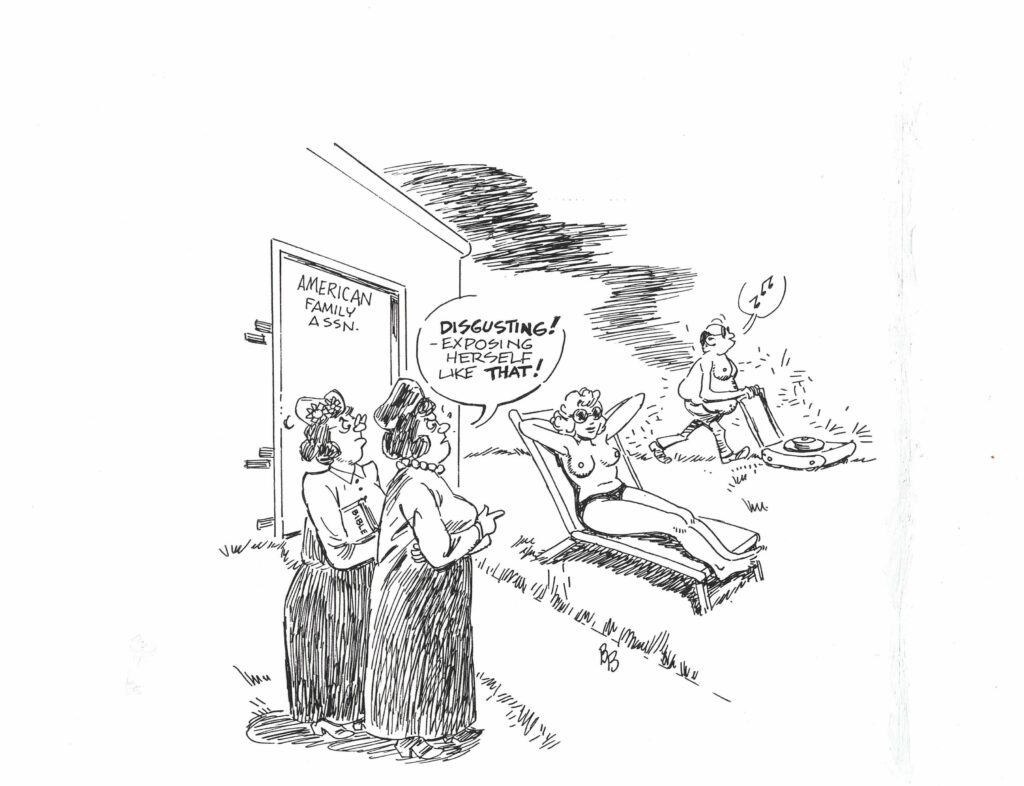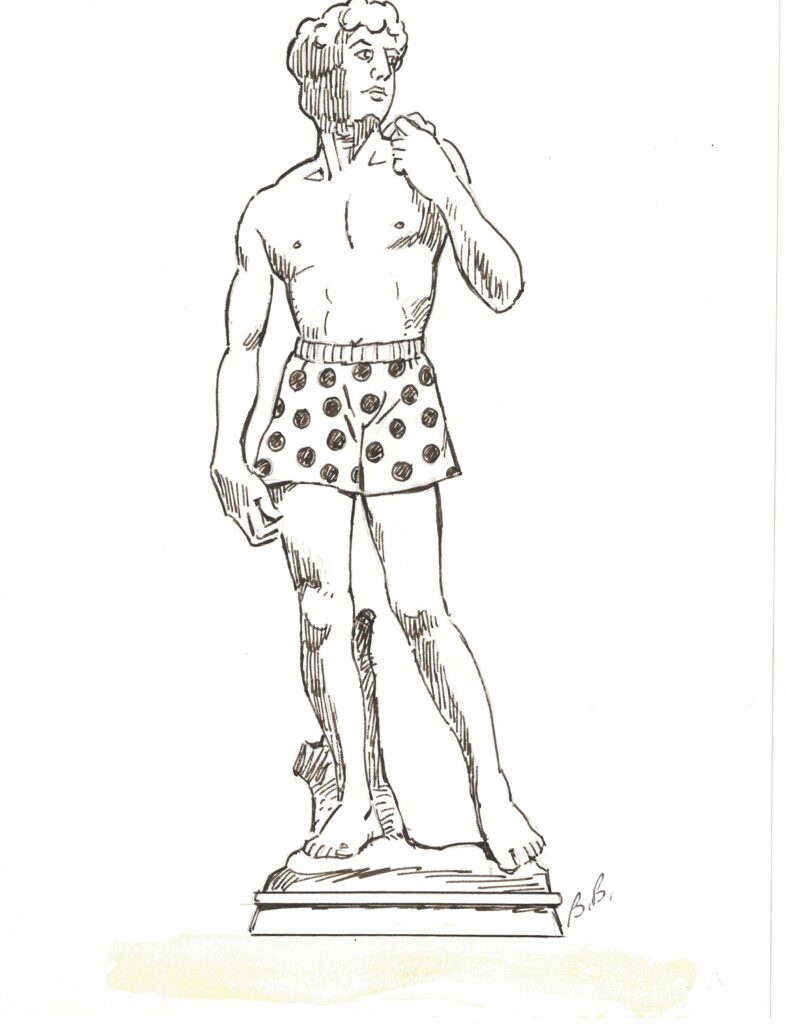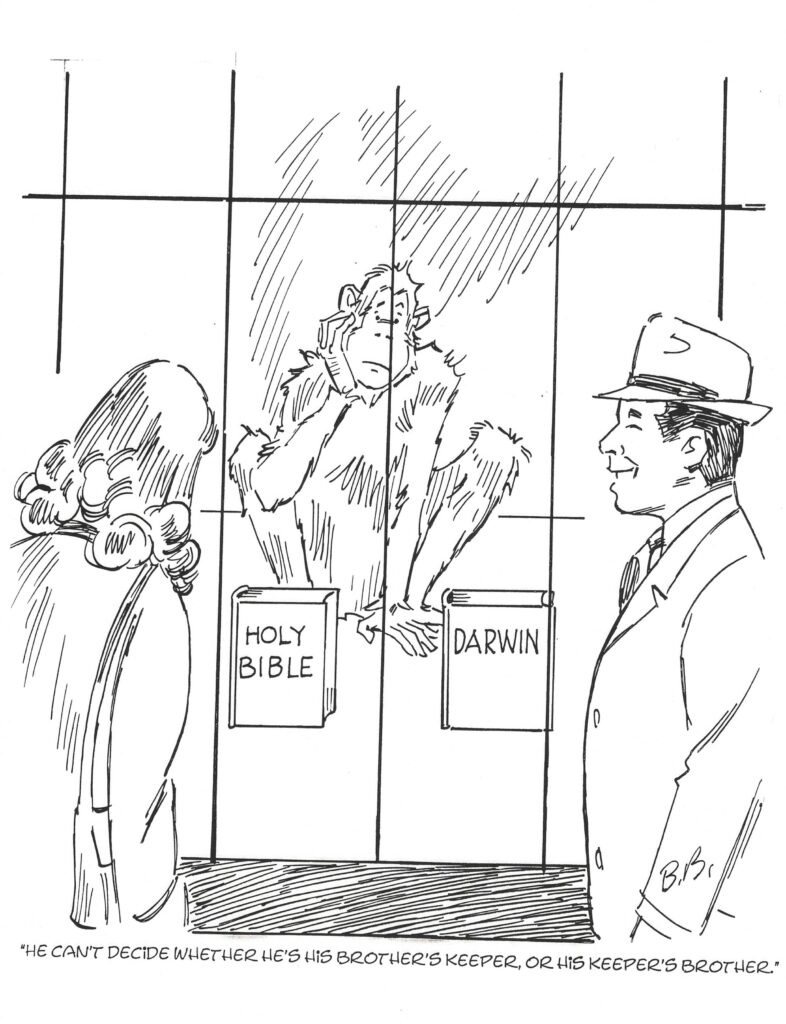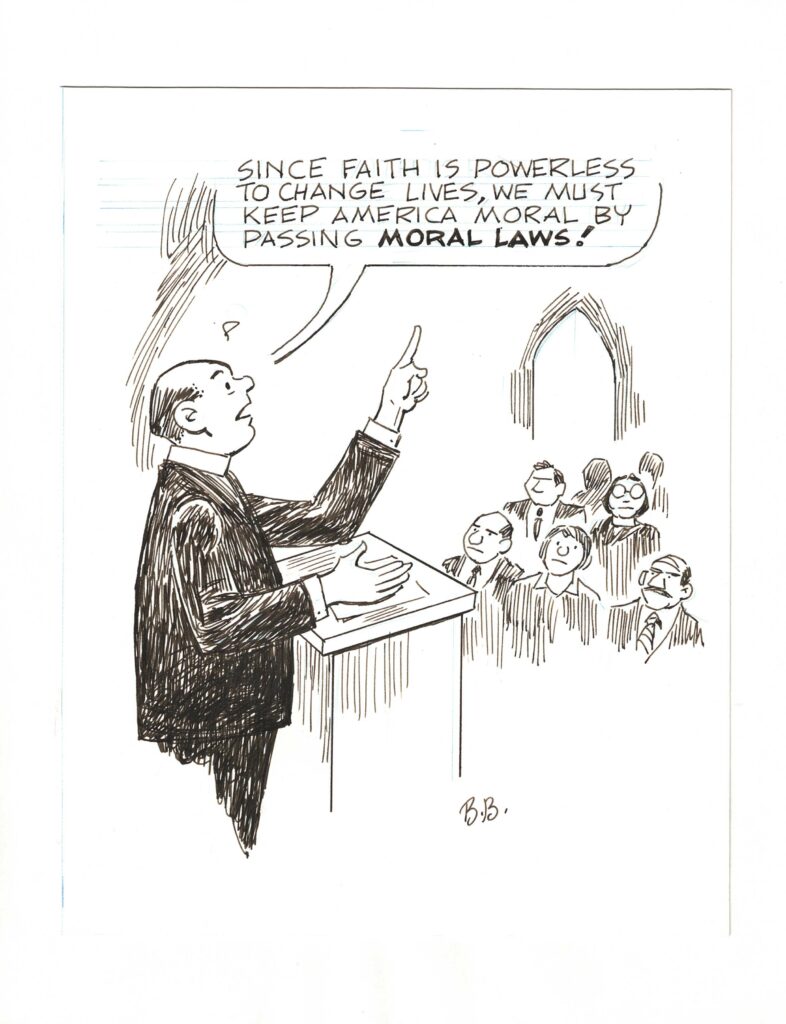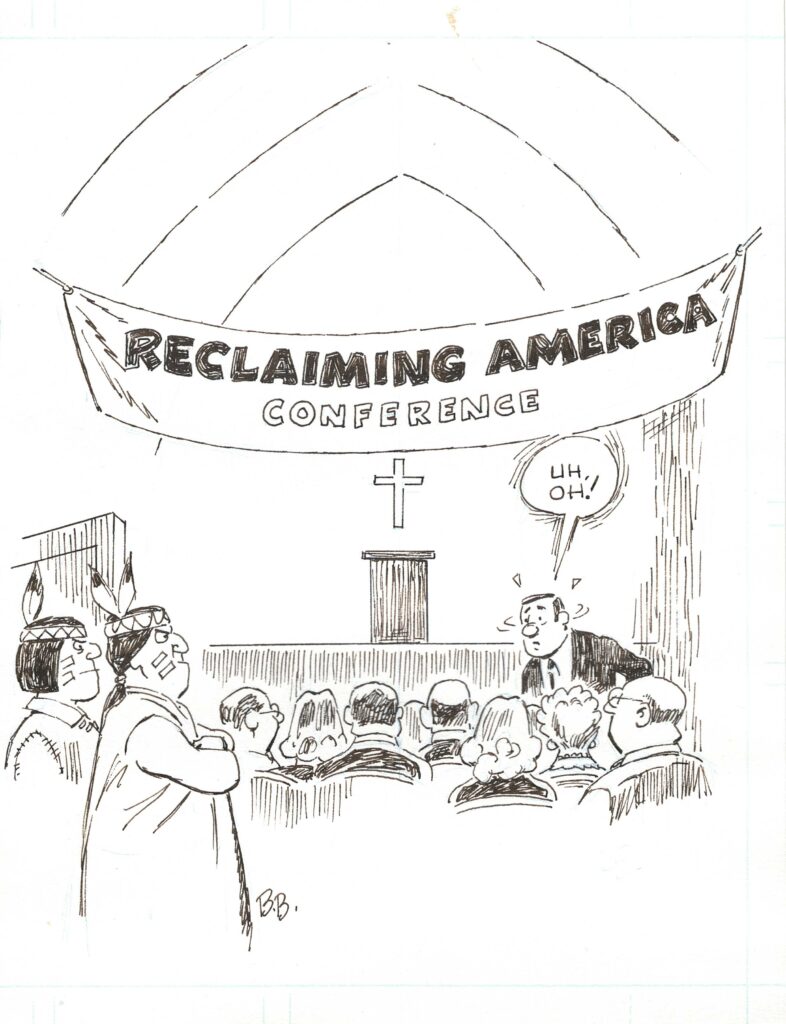Activists Ben Brown (1921-1997) and Skipp Porteous (1944-2018) combined their artistic skills and wit to create political cartoons that lampooned the Christian fundamentalist movement of the 1990s.
The Institute for First Amendment Studies (IFAS) to which they belonged, was founded in 1984 to monitor the Christian right’s influence in the United States. The cartoons in this exhibition were created by Brown and Porteous using simple pen and paper for Freedom Writer, the IFAS periodical.
The art pokes fun at figures, events, and ideologies prominent in the American right-wing and evangelical movements of the time and conveys the personal viewpoints and talents of the creators.
The cartoons of Brown and Porteous, the work of the IFAS in general, as well as the efforts of the Christian right, represent a case study in how the freedoms of the First Amendment can be exercised to enact change or promote a world view. The dynamic between two opposing forces, both using the same freedoms to advance their respective causes, is the essence of the First Amendment.
These cartoons represent one side of a theological, social, and political debate that continues today. Though the IFAS legally dissolved in 2005, many of the subjects Brown and Porteous lampooned, such as Pat Robertson, the Promise Keepers, Pat Buchanan, and Focus on the Family, remain active today.
Brown’s pieces were generously donated to the First Amendment Museum (unrelated to the IFAS) by Barbara A. Simon in 2019.
Note: As a non-partisan institution, the First Amendment Museum celebrates people who exercise their First Amendment rights and does not in any way endorse the political or social messaging behind the artwork displayed in this exhibition.
Warning: Some of the cartoons could be considered offensive or disrespectful.
Click on each image to enlarge.
“The End of the World is Near” December 1995
Ralph Reed is a politician, lobbyist, and political consultant from Georgia who led the Christian Coalition during the early 1990s. The Christian Coalition is a Protestant Christian advocacy group in the United States founded by the right-wing evangelical Christian and media mogul Pat Robertson.
In this comic, Robertson holds a sign predicting the end of the world, while Ralph Reed holds a similar sign with the caveat, “But not before the ‘96 elections.” Brown and Porteous use this comic to demonstrate how Robertson and Reed use “end of times” proclamations to scare people into voting certain ways, donating money, getting involved in advocacy, and behaving themselves according to Christian principles.
“Evolution” January – February, 1996
This cartoon highlights the confusion caused by the differing definitions of the word “theory” as used in the field of science versus everyday parlance. A scientific theory is used to describe what was once just a hypothesis but has since been repeatedly tested and verified. A theory, in regular discourse, just means a simple hypothesis or guess. Those who wish to discredit the scientific theory of evolution often exploit the confusion caused by the casual usage of the term ‘theory.’ The Biblical belief that a higher power created the earth (which cannot be subjected to the scientific method) has been termed creation science by its supporters, further confusing the language.
The cartoon is ironic because the boy is reading a “science” book that says the proven theories of evolution and gravity are just theoretical, while an apple (symbolic of Newton’s theory of gravity) falls on his head.
“Christian Nation” June, 1996
Two Native Americans watch as a European ship sails towards them, exclaiming: “If they’ve come here to form a Christian nation- we ought to be okay!” Many Europeans came to the Americas to establish religious colonies based on their Christian belief systems. Hardly living up to their proclaimed Christian principles, however, European colonists exterminated, removed, and enslaved the indigenous populations. This comic is a reminder of the violent tendencies associated with those who have wished to establish a “Christian nation,” an oft-repeated aim of the Christian right.
“Onward Christian Soldiers” July, 1996
“Onward Christian Soldiers” is a popular hymn dating back to 1865. The pastor in this comic, leading his congregation in the hymn, is sporting a gun and ammunition bandolier as a soldier would. A woman whispers, “Our pastor is such a literalist!” “Literalism” is a method of reading the Bible and interpreting everything in it as factually correct. In this piece, Brown and Porteous convey their belief that taking the Bible literally leads to ridiculous consequences.
“Promise Keepers” January – February, 1997
Promise Keepers is an evangelical Christian organization for men that was founded by Bill McCartney, a retired football player, in 1990. The group opposes same-sex marriage and champions chastity, marital fidelity, and the belief that the man should be the head of the household. Brown and Porteous, however, believe the only promise being kept by Promise Keepers is to vote Republican, the party most associated with right-wing Christianity.
“Jesus is Coming” March, 1996
This comic, featuring Jesus Christ furiously riding a donkey towards Jerusalem, pokes fun at the popular usage of “Jesus is coming” and ichthys bumper stickers. Instead of a car, however, Brown and Porteous have portrayed the stickers on Jesus’s donkey.
“Judeo” September, 1996
“Judeo” is a term for something related to Judea, the ancestral homeland of the Jewish people. Essentially, it is another way of describing something associated with Judaism. The term “Judeo-Christian” is used to group Christianity and Judaism together, usually as related or connected ideologies. In this comic, Brown and Porteous recognize the irony that many evangelical Christians are not as aware of their own religious ideology as they often purport to be.
“911?” November, 1995
In one of their more controversial works, a young man desperately calls the police to arrest his girlfriend who is “threatening to have an abortion!” This comic attempts to show the absurdity, according to Brown and Porteous, of trying to outlaw abortion in the United States.
“President Buchanan” April, 1996
Pat Buchanan is a conservative Christian political commentator, politician, and broadcaster who ran for president in 1992, 1996, and 2000. In this comic, Brown and Porteous mock Buchanan by depicting him gazing at the Capitol building which flies a Confederate battle flag and is adorned by a Christian cross.
This cartoon was made after a speech Buchanan made in 1995 which supported those fighting to keep the Confederate battle flag flying atop the South Carolina capitol building. Buchanan claimed the Confederate flag represented, “valor, honor, courage and the willingness to die for your country.”
“Focus on Your Own Damn Family” August, 1996
Focus on the Family is a fundamentalist Christian organization that was founded in 1977 by James Dobson, an evangelical Christian author and psychologist. It promotes socially conservative views on public policy including creationism, abstinence-only sex education, adoption only by heterosexuals, school prayer, and traditional gender roles. It opposes pre-marital sex, LGBTQIA+ rights, pornography, drugs, gambling, divorce, and abortion.
Brown and Porteous play on the name “Focus on the Family” by telling them to “Focus on your own damn family” via a bumper sticker on a car in this comic.
“Not in My Lifetime” October, 1995
In this cartoon, a man is praying to God asking when the United States “will be a Christian nation?” God, in the form of an action bubble, responds: “Not in my lifetime!”
“New One-Channel TV” May – June, 1997
Pat Robertson is a conservative evangelical Christian. In 1990, Robertson founded International Family Entertainment (IFM), a television channel that played only Christian-oriented family-friendly programming. Today, IFM has changed owners and is now known as ABC Family Worldwide. It has also dropped most of its connections to evangelical Christianity.
“Disgusting!” No Date
This cartoon features two caricatures of stereotypical prudish Christian women, representing the American Family Association, condemning another woman for sunbathing topless while they completely ignore her male counterpart who is mowing the lawn in the background, also topless. The American Family Association is a Christian fundamentalist organization that seeks to “promote the Biblical ethic of decency in American society with primary emphasis on television and other media.” Brown and Porteous use this cartoon to expose the gender-biased double-standard of “decent” behavior in Christian morality.
“Michaelangelo in Underwear” No Date
This comic is the first Brown made for the IFAS, as well as his first collaboration with Porteous. In response to the National Endowment for the Arts’ (NEA) censoring of “indecent” art, Porteous called Brown with the idea of depicting Michelangelo’s “David” with clothes on to cover up his nudity, thus satisfying the NEA’s new moral requirements.
“He Can’t Decide” No Date
In Genesis 4:9 of the Bible, the Lord asks Cain, “Where is your brother Abel?” Cain replies, “I don’t know, am I my brother’s keeper?” In this comic, an ape in a zoo is choosing between a Bible and a book on evolution by Charles Darwin. Since Darwin theorized that humans evolved from apes, the human viewing the ape jokes, “He can’t decide whether he’s his brother’s keeper or his keeper’s brother,” referring both to the Biblical verse and the theory of evolution.
“Moral Laws” October, 1996
Here, Brown and Porteous mock the supposed power of faith by pointing out the quandary: if faith is so powerful, why do religious groups feel the need to pass laws that enforce the morality that faith supposedly instills?
“Reclaiming America Conference” March – April, 1997
“Reclaiming America” is a common catchphrase utilized by the Christian right to denote the general effort to instill supposed Christian principles into public policy and law. The phrase imagines an idyllic past in which the United States was once a proud Christian nation. Today, there is an active right-wing Christian advocacy organization known as “Reclaiming America for Christ.” In this comic, two Native Americans are frustrated to see that the “Reclaiming America Conference” is for Christians rather than fellow Native Americans, the earliest inhabitants of what is now the United States.
